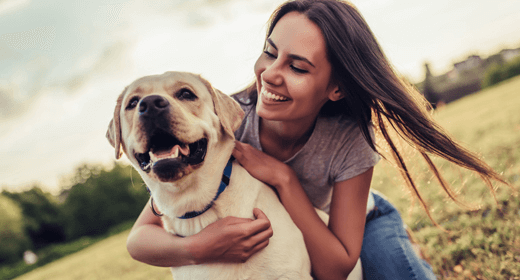

Watch as Expert Dog Trainer Kathy Santo talks about how to crate train your puppy. She’ll go over everything from the philosophy behind the crate training method to precautions you should take to make sure that it’s a positive experience for the both of you.
Hi, I'm Kathy Santo with IAMS, and today we're going to talk about how to crate train your puppy. We'll begin with a general discussion on the philosophy supporting the crate training method. We'll review what you'll need, the steps involved in the process itself, and some possible troubles you may encounter along the way. Before you begin crate training, it helps to understand the philosophy behind this method. If your dog is properly crate trained, he'll view his crate as a private room with a view, a safe haven he can call his own, and a quiet place he can relax in. He won't see it as a rigid structure of confinement and punishment. In fact, it'll be just the opposite. In nature, wild dogs seek out and use their den as a home where they can hide from danger, sleep, and raise their young. In your home, the crate becomes your puppy's den, an ideal spot to sleep and stay out of harm's way. And for you, the benefits of crate training are house training, because your puppy won't like to soil the area where he sleeps, limited access to the rest of the house, where he learns the house rules, and transporting safely and easily in the car. Start crate training a few days after your puppy settles in. Before you can start crate training, you and your family members must understand that the create can never be used for punishment. Never leave your young puppy under six months in his crate for more than three hours. He'll get bored, have to go to the bathroom, and won't understand why he's been left alone in discomfort. As your dog gets older, he can be crated for longer periods of time, because his bladder isn't as small. But keep in mind he still needs a healthy portion of exercise and attention daily. If you and your family are unable to accommodate your puppy's exercise, feeding, and bathroom needs, consider hiring a dog walker or asking a neighbor or friend for assistance. After that, the crate should be a place he goes into voluntarily, with the door always open. There are a variety of crates available for purchase these days, each of which is designed for a different lifestyle need. When selecting a crate, you want to make sure it's just large enough for your puppy to be able to stand up, turn around, and lay down in comfortably. Because your puppy will grow quickly, I often recommend getting a crate that fits the size you expect your puppy to grow to, and simply block off the excess crate space, so your dog can't eliminate at one end and retreat to the other. The two most important things to remember while crate training are that it should be associated with something pleasant, and takes place in a series of small steps. The first step is to introduce your puppy to his crate. This will serve as his new den. Put bedding and chew toys in his crate, and let him investigate his area. If he chews or urinates on his bedding, permanently remove it. Observe and interact with your puppy while he's acclimating to his crate. This will help forge a sense of pack, and establish you as the pack leader. Encourage him to enter the crate with soft words and some treats. You can also pre-place some treats in the back corners and under the blankets to help make it a pleasant experience. Step two is to start feeding your puppy in his crate. Begin with the bowls near the opening of the crate. As your puppy becomes less reluctant to enter, slowly inch the food back every feeding, until you're placing it all the way in the back. When you get to the point where your puppy happily enters the crate, and stands in the back to eat, begin gently closing the crate door behind him while he's eating. At first, open the door immediately after he finishes. But after that, begin leaving the door closed a bit longer every time. If your puppy cries, you may have increased the time too fast. So decrease the length of it, and then slowly begin increasing it again. When he does cry, do not let him out until he stops, or he'll always do this to get his way. Once your puppy is used to eating his meals and waiting to be let out with no anxiety or crying, you can start confining him longer when you're home. To do so, call him over with a treat, and give it to him in his crate. Associating a command such as 'kennel' is important, so he understands the reward is a result of going in the crate. At first, you'll need to sit quietly next to him. If he's fine after 10 minutes, go into the other room for a bit, and then come back and let him out, only if he is calm and not crying. If he is crying, you'll have to wait until he's calm. Once you can leave him for about 30 minutes at a time without him getting upset, you can start leaving him there longer. Eventually, decrease the amount of reward you give him for entering the crate, so that saying the command word is sufficient. When you get home after being away for a long time, your puppy will likely be very excited to see you. It's important not to reward this behavior, or anticipating your arrival every day may be stressful for him. And lastly, make sure to crate your dog for short periods of time while you're home, or else he will associate crating with being left alone. I'm Kathy Santo with IAMS, and I hope that you found this helpful as you welcome your new addition to your family.


If you own a dog, chances are, you deal with the nuisance of shedding fur. Fortunately, there are some easy ways to help keep your dog's shedding to a manageable level.
If you own a dog, chances are, you deal with the nuisance of shedding fur. Fortunately, there are some easy ways to help keep your dog's shedding to a manageable level.
The main factor related to how much your dog sheds is which breed you own. Certain breeds, such as Yorkshire Terriers and Poodles, hardly shed at all, and are especially well suited for people who suffer from dander-related allergies. But if one of these hypoallergenic breeds is not your dog of choice, then chances are you deal with some amount of shedding. Here are some practical tips to deal with all of that hair.
Many dogs are seasonal shedders. As the temperatures begin to drop, so does the fur. Dogs shed their summer coats in the fall as their winter coats come in. The best way to deal with this is to be prepared. Brush your dog more often and vacuum more frequently. This will keep that extra hair from becoming too unmanageable.
Dogs also will go through their own version of spring cleaning. When the temperatures begin to rise in the spring, dogs will begin shedding that extra winter hair. Again, preparation is the key. Regular brushing and vacuuming will help you get through these “hairy” times.
Between the millions of strands of hair constantly growing, some breeds of dogs grow up to a total of 100 feet of fur per day! But, while your dog might not boast those kinds of hair-growth numbers, constantly replacing fur still places a demand on a dog’s system. Thirty percent of a dog's protein needs go toward hair growth. If a dog is not receiving proper nutrition, the dog's body will put the protein he's receiving toward maintaining muscle mass, leaving the coat to suffer.
A healthy, shiny coat is not only a sign of proper nutrition, but it also sheds less than an unhealthy coat. Premium dog food like IAMS™ ProActive Health™ provides dogs with the nutrients they need to keep their coat healthy, which means less shedding.
Brushing doesn't have to be a necessary evil. Train your dog to enjoy brushing, offering frequent praise during the process, and maybe even a treat at the end. This is easiest done from the time your dog is a puppy, but older dogs can be taught to enjoy brushing as well. The importance of brushing cannot be overemphasized. Just look at all the hair that ends up in the brush, and realize if it weren’t in the brush, it would be on your couch, floor, and perhaps, bed.
Be sure you're using the right kind of brush for your dog's coat. Breeds with thick undercoats need a specific type of brush, while longhaired breeds need a comb.
Last but not least, make sure to give your dog an occasional bath. Aside from the obvious benefit of having a clean, good-smelling pooch, your dog's coat will also benefit. Be warned though: Bathing your dog too frequently washes away the natural oil on his skin and coat, resulting in dry skin and, you guessed it, more shedding.
Committing the time to maintaining your dog's coat will help keep his shedding under control. Frequent brushing and vacuuming, and feeding your dog a balanced diet such as IAMS ProActive Health Adult MiniChunks will have you worrying less about an overabundance of hair and more time enjoying your furry friend.